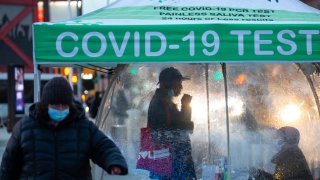
- The immune response of people infected with omicron appears to increase protection against delta more than fourfold, according to a study from South Africa.
- Omicron could displace delta as a consequence, the team of scientists found.
- If omicron also proves less severe, Covid infections could prove less disruptive to society, they wrote.
- However, the study has not been peer-reviewed, current data on severity is preliminary and epidemiologists have warned omicron could still strain hospitals.
People infected with the heavily mutated omicron variant of Covid-19 may have increased immune protection against delta, a new study says.
As a consequence, omicron could displace delta, according to the small study published by South African scientists this week.
The findings could have significant implications for nations such as the United States where omicron infections are rapidly increasing but the delta variant, which has caused an increase in hospitalizations, is still widespread.
Get top local stories in Southern California delivered to you every morning. Sign up for NBC LA's News Headlines newsletter.
"These results are consistent with Omicron displacing the Delta variant, since it can elicit immunity which neutralizes Delta making re-infection with Delta less likely," the team of scientists, led by Khadija Khan at the Africa Health Research Institute, wrote in their findings.
If omicron displaces delta and proves more mild than past variants, "the incidence of Covid-19 severe disease would be reduced and the infection may shift to become less disruptive to individuals and society," according to the scientists' findings.
Omicron was first identified by South Africa and Botswana in November.
Money Report
The study has not yet been peer-reviewed. Researchers have been publishing their findings before they are evaluated by other experts in the field due to the urgent nature of the pandemic.
The study followed 13 people, 11 of whom had been infected with the omicron variant. Seven of the participants were vaccinated: three people who received two doses of the Pfizer and BioNTech vaccine and four who received the Johnson & Johnson shot.
The antibody response of people infected with omicron appeared to increase protection against the delta variant more than fourfold two weeks after the participants enrolled in the study. Participants also showed a fourteenfold increase in the ability of antibodies to block omicron reinfection.
However, the scientists cautioned that it is unclear whether increased protection is due to omicron-induced antibodies, vaccination or immunity from a previous infection. Vaccinated individuals demonstrated stronger protection.
In the United States, omicron represented 58% of sequenced Covid cases while delta represented 41% last week, according to data from the U.S. Centers for Disease Control and Prevention.
Hospitalizations in the U.S. surged during the fall due to the delta variant, straining health-care systems in several states. More than 70,000 people in the U.S. are currently hospitalized with Covid, up 3% over the past week, according to a seven-day average from the Health and Human Services Department as of Dec. 27.
The highly contagious omicron variant is driving a surge in U.S. Covid infections. The country reported an average of more than 237,000 daily new cases for the seven-day period ended Monday, up 66% over the past week, according to a CNBC analysis of data from Johns Hopkins University.
Real-world studies from South Africa and the United Kingdom suggest that people infected with omicron develop more mild illness compared with delta.
The U.K. Health Security Agency found that people infected with omicron are 50% to 70% less likely to require hospital admission compared with delta. However, the agency noted the results are "preliminary and highly uncertain" due to the small number of omicron hospitalizations right now, the inability to measure all previous infections, and because omicron has not spread widely among older and therefore more vulnerable age groups.
South African scientists found that people infected with omicron are 70% less likely to develop severe disease compared with delta. However, they also noted their study has limitations due to limited information on vaccination status and widespread immunity from prior infection.
Epidemiologists have warned that even if omicron proves less severe than delta, it could still overwhelm hospitals simply by spreading much faster than delta.
The World Health Organization has said omicron is spreading faster than any previous Covid variant. A study from Hong Kong found that omicron replicates 70 times faster in human airways, but infection in the lungs appears less severe.






